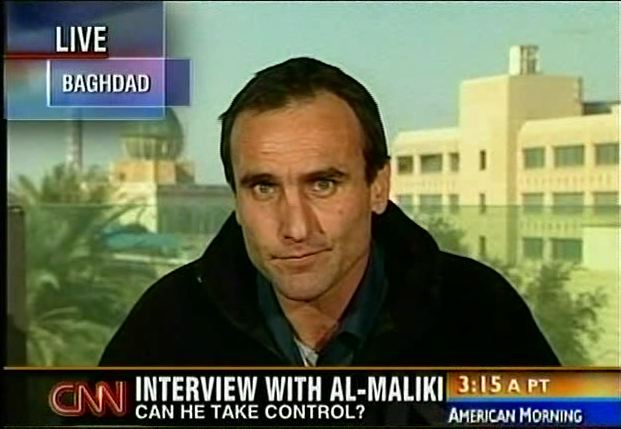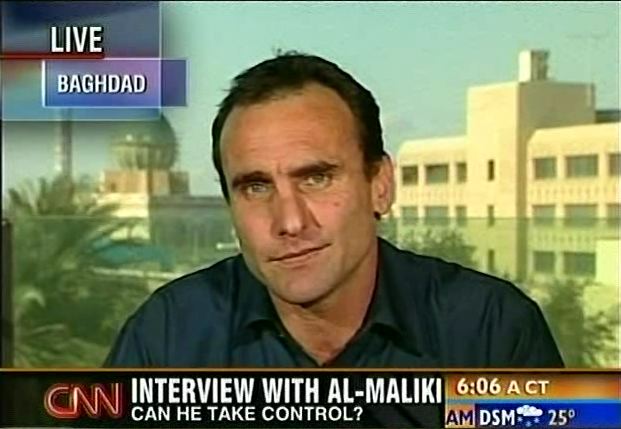AAM: Back in Baghdad

Click photo to play
Length: 3:21
SOLEDAD O'BRIEN: Iraqi Prime Minister Nuri al-Maliki is the man that the United States is counting on to take control of the violence in Iraq. Eventually, the theory goes, that will allow U.S. troops to come home. Well, this morning, an exclusive interview with the Iraqi leader. He spoke to CNN's Michael Ware, who joins us this morning.
Good morning, Michael.
MICHAEL WARE, CNN CORRESPONDENT: Good morning, Soledad.
Yes, we've just spoken to the prime minister of Iraq. The man who America is looking to as the way out of this country for American troops.
Now the focus very much is on the security situation here in the capital Baghdad. When we met with Prime Minister al-Maliki, this is very much what he wanted to talk about. How he believes the new strategy that he and American commanders have launched upon will begin to curb the violence. Now while he says with more American support he believes his forces can take over in three to six months -- something he's said before -- what he also said, more surprisingly, is that if it goes the other way, he might ask for an escalation of American troops.
(BEGIN VIDEO CLIP)
NURI AL-MALIKI, IRAQI PRIME MINISTER, (through translator): One of the major issues for President Bush's plan, which we consider a support to our Baghdad security plan, is the extent to which there's a need for additional troops, American and multinational, to support the operations and we agree this will be assessed by those in the field. The military commanders. And if their assessment is for more, we will ask for these troops. But we believe that the existing number, with a slight addition, with do the job. But if there seems to be more need, we will ask for more troops.
(END VIDEO CLIP)
WARE: Now, one of the key targets of these troops, of course, are the militias that seem to have taken this country by a death grip. That's certainly dominating the government of this prime minister. We asked him specifically about the rebel anti-American cleric Muqtada al-Sadr, who does have an outstanding arrest warrant against him.
Now the Americans will very much be looking to the prime minister in how he handles Muqtada, the man who put the prime minister into his job, to test the true value of his commitment against the militias. When we asked what he was going to do with Muqtada, this is what the prime minister had to say.
(BEGIN VIDEO CLIP)
AL-MALIKI: I will apply the law to everyone, as I said. On militias, political parties, on the participants in the political process. The law rules. And who is on my side in respecting the law and the government's will, will be an ally and a partner. And those who rebel against the law and the government's will, will be a foe.
(END VIDEO CLIP)
WARE: Now it's difficult to read into that just exactly what he means, but he did, in fact, then go on to say that Muqtada al-Sadr, despite American intelligence claims of his violence against U.S. troops, had become potentially a model for other militias to follow in joining the political process, given recent commitments to disarm and lower the levels of violence.
The prime minister also said all of the neighboring countries -- particularly Iran, Turkey, Jordan -- want to interfere in Iraq. And, indeed, he said he would not correct American intelligence when they say Iran is working to kill U.S. soldiers.
Soledad.
S. O'BRIEN: A fascinating interview. Michael Ware for us this morning with that.
Thanks, Michael.
Miles.

Click photo to play
Length: 2:29
MILES O'BRIEN: CNN's Michael Ware has as much experience reporting on Iraq as anybody. We'll bring him in now. He has an exclusive interview with the Iraqi Prime Minister al-Maliki.
But before we get to that, I want to ask you, Michael, about the allegations of Iranian meddling. And perhaps even staging this daring attack. What's the word on the street there in Baghdad about this?
MICHAEL WARE, CNN BAGHDAD CORRESPONDENT: Well, obviously, Miles, information is so scant about this attack that it's impossible to say for sure just who has pulled this off. Clearly, Al Qaeda has to be considered, as do Sunni insurgents. Yet, given where it happened and given the nature of it, perhaps there is reason to be looking towards Shia militia.
Now, many of these Shia militia, according to American intelligence, are backed, supported, armed, and trained by Iran. Now, indeed, U.S. military intelligence says the Iranians are working to kill American soldiers.
And in our interview with Iraqi Prime Minister Nouri al-Maliki today, he said that, in fact, not only can he not rule it out, he believes that, yes, in fact, that is happening. He says Iranians are targeting Americans, and Americans are targeting Iranians in his own country.
Now, whilst the mood generally in Washington may be for withdrawal of American troops, Prime Minister Maliki says he believes a new strategy will work, but he is showing signs of strain in the relationship with Washington. He was critical of past mistakes. He said more support means they could take over quicker here in Iraq, but he also kept the door open for an escalation. Here's what he had to say.
(BEGIN VIDEO CLIP)
NOURI AL-MALIKI, PRIME MINISTER OF IRAQ (through translator): One of the major issues for President Bush's plan, which we consider a support to our Baghdad security plan, is the extent to which there's a need for additional troops, American and multi-national, to support the operations.
And we agree this will be assessed by those in the field, the military commanders. And if their assessment is for more, we will ask for these troops. We believe that the existing number, with a slight addition, will do the job, but if there seems to be more need, we will ask for more troops.
(END VIDEO CLIP)
WARE: So it was rather a grim picture that the Iraqi prime minister was painting. He believes that there is still a way forward. Yet, clearly not everything is going well, and the relationship with Washington is becoming more and more prickly, Miles.
M. O'BRIEN: Michael Ware, live from Baghdad.
Soledad.
